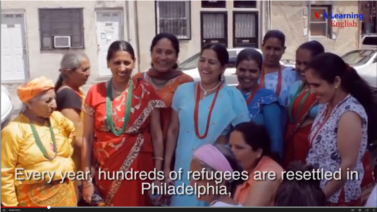As religious minorities increase in the United States, some want public schools to close not only on Christmas, but also on their religious holidays. The issue is being debated in Montgomery County, Maryland, near Washington, D.C. It has become a difficult issue for local school boards, which set education policy in cities or towns. Unlike in many countries, in the United States public schools are under the control of local officials -- not state or federal governments.
In most U.S. public school districts, the number of religious minorities is small. But in Montgomery County, about 10 percent of students are Muslim.
Musa Siddiqi is in the fourth grade. He says school should be closed on the Muslim holiday Eid al-Adha, the Feast of the Sacrifice.
“Whenever I have Eid on school days, I have to be dropped off of school (be absent) and then it goes on my report card, and I do not like how that goes.”
Some Muslims also want schools to close on Eid al-Fitr at the end of Ramadan. At least six U.S. school districts already close on both Eid al-Adha and Eid al-Fitr.
Zeinab Chaudry is a member of the Council on American-Islamic Relations. She welcomes the fact that school officials have given Muslim students permission to miss classes on religious holidays. But she thinks it is unfair for Muslim children to miss class when other children are in school.
“Classes are still in session, so they still miss classroom instruction. Teachers will still teach. If there is exams that will be scheduled for that day, there will still be exams the students will miss out on if they decide to take off from school.”
Montgomery County has some of the best schools in the United States. People from around the world live in the county. Local residents celebrate many different holidays.
This year, Eid al-Adha will be celebrated at the same time as the Jewish holiday Yom Kippur. Schools in the county have been closed on Yom Kippur since the 1970s. Back then, school board officials found that 15 percent of the students and teachers were out of school on the holiday.
Recently, parents of Muslim students attend a meeting of Montgomery County board of education. Batya Steinlauf is a Jewish religious leader and a member of the Jewish Community Relations Council of Washington. She supported the Muslim parents.
“To communicate an appreciation of the rich diversity of Montgomery County.”
But the board’s chairman, Phil Kauffman, said a government agency should not recognize any religious holiday.
“I do not think we should have any mention of specific religious holidays in our calendar because we are a public school.”
The board voted to remove all of the names of religious holidays -- including Christmas -- from the official school schedule. However, schools will still be closed on those days.
Saqib Ali is a parent and member of the “Equality for Eid Coalition.” He was not happy about the vote.
“It seems like someone’s bending over backwards really, really hard to try not to give equality to the Muslim community.”
He said many residents will reject the board’s decision.
“It is going to cause significant backlash in the wider community against the school board, and against this administration.”
Some people reacted to the decision on social media. They accused the school board and Muslims of opposing Christmas.
Charles Haynes works at the Religious Freedom Center. He says the school board is in a difficult position.
“…because the United States is now one of the most religiously diverse places in the world. And more and more religious minorities in the United States are speaking up and saying, ‘We are here too. You have accommodated the Christians and the Jews on the calendar. What about us?’”
Mr. Haynes says if a religious group is large enough, it may be able to pressure a school to close because so many students will be absent on that faith’s holiday.
“But absent that argument, the school board may not do it, without violating the First Amendment.”
Among other things, the First Amendment to the United States Constitution requires a separation between religion and government.
New York City Mayor Bill de Blasio promised during his campaign last year to close schools in America’s largest city for Eid. If he does, it may help Muslim parents in Montgomery County and other places.
I’m Bob Doughty.
VOA Religion Correspondent Jerome Socolovsky reported this story from Washington. Christopher Cruise wrote it for VOA Learning English. George Grow edited it.
Words in this Story
district – n. an area or section of a country, city or town; an area established by a government for official government business
absent – adj. not present at a usual or expected place
report card – n. a written statement of a student’s grades that is given to the student’s parents
bending over backwards – idiom to work very hard to accomplish something for someone; to go out of one's way (to do something) (for someone)
backlash – n. a strong public reaction against something
Do you believe government-run schools should observe religious holy days? Should the holy days of all religions be recognized or only the holy days of religions with large numbers of members in the comunity? We want to hear from you. Write to us in the comments section.
